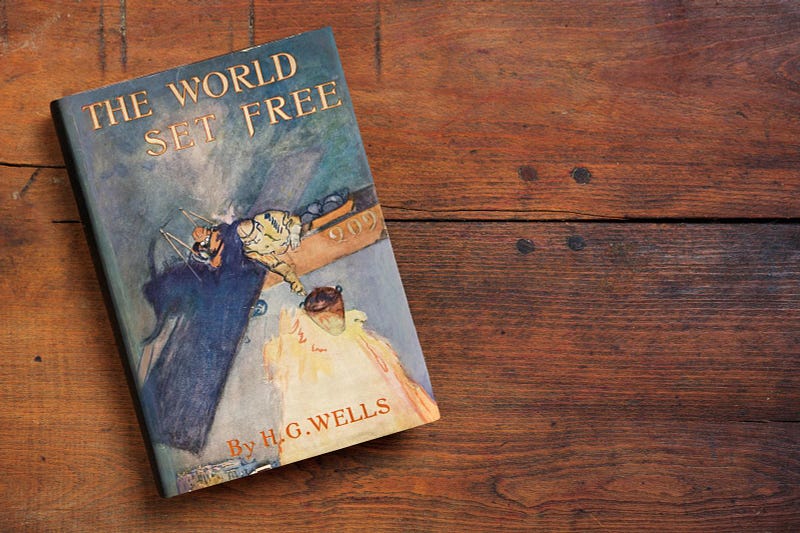The Influence of H.G. Wells on Atomic Warfare Predictions
Written on
Chapter 1: The Dawn of the Atomic Age
On July 16, 1945, a colossal 40,000-foot mushroom cloud ascended from a remote desert in Alamogordo, New Mexico. This event marked the beginning of the Atomic Age, an era where nuclear power would shape global power dynamics. World leaders hurried to establish themselves as nuclear powers, gathering top scientists and forming secretive research organizations.
Before the first atomic bomb was detonated, science fiction author H.G. Wells made astonishing predictions in his 1914 novel, The World Set Free. He foresaw the splitting of the uranium atom and the subsequent invention of the atomic bomb, detailing its potential benefits for humanity as well as its catastrophic consequences. He imagined a future free from war, envisioning a conflict so severe that it would end all warfare.
> "We should not only be able to use this uranium and thorium; not only should we have a source of power so potent that a man might carry in his hand the energy to light a city for a year, fight a fleet of battleships, or drive one of our giant liners across the Atlantic. (…) Do you realize, ladies and gentlemen, what these things would mean for us? It would mean a change in human conditions that I can only compare to the discovery of fire, that first discovery that lifted man above the brute." (The World Set Free, H.G. Wells)
But did Wells simply predict the atomic bomb's invention, or did he play a role in its actual development? This question unveils a captivating narrative.
Science fiction has often fueled advancements in various scientific fields. For instance, Jules Verne's Twenty Thousand Leagues Under the Sea inspired Simon Lake to create the first submarine, The Argonaut. Similarly, George Orwell's 1984 introduced concepts like the "telescreen," long before they became realities.
However, The World Set Free stands out as it exemplifies a case where science fiction directly influenced scientific research rather than merely forecasting it.
Section 1.1: The Premise of The World Set Free
In The World Set Free, a visionary scientist discovers a method to harness atomic energy, transforming the entire energy sector. Coal is rendered obsolete as atomic energy proves to be a cleaner, more efficient alternative. Yet, as history often shows, humanity's lust for power leads to devastating nuclear conflict among the world's most formidable nations, resulting in massive casualties.
> "Whole blocks of buildings were alight and burning fiercely, the trembling, ragged flames looking pale and ghastly and attenuated in comparison with the full-bodied crimson glare beyond." (The World Set Free, H.G. Wells)
By the novel's conclusion, after witnessing the horrors unleashed by nuclear warfare, the idealistic leaders in Wells's imagined world experience a moral awakening. They unite to establish a world government aimed at creating a more just and compassionate society.
Section 1.2: Leo Szilard's Connection to Wells
Leo Szilard, a brilliant Hungarian physicist, believed that nuclear research could unlock the secrets of interplanetary travel. He met Wells in 1929 but only read The World Set Free three years later. Szilard was deeply moved by Wells's insights into human nature and society. A year after reading the book, he conceived the idea of chain reactions, heavily influenced by Wells's depiction of atomic energy and its military implications.
> "All the things which H.G. Wells had predicted appeared suddenly real to me," Szilard later remarked.
Similar to the leaders in The World Set Free who underwent a moral transformation, Szilard was horrified by the destruction in Hiroshima and Nagasaki. This experience compelled him to pivot away from nuclear research, advocating instead for international arms control and complete disarmament. He believed this was the only viable path to counteract the escalating obsession with atomic energy.
Chapter 2: The Lasting Legacy of The World Set Free
The first video, "That Time a Science Fiction Writer Accidentally Almost Revealed the Manhattan Project," discusses the intriguing intersections between fiction and historical events.
In the second video, "3 Key Lessons from American Prometheus | Book Review & Summary," key insights from the biography of J. Robert Oppenheimer are explored, including the ethical implications of atomic research.
Despite not accurately predicting the iconic mushroom cloud associated with nuclear explosions, The World Set Free remains one of the most significant works of science fiction, providing an early depiction of nuclear warfare and emphasizing the dire consequences of humanity's pursuit of power.
